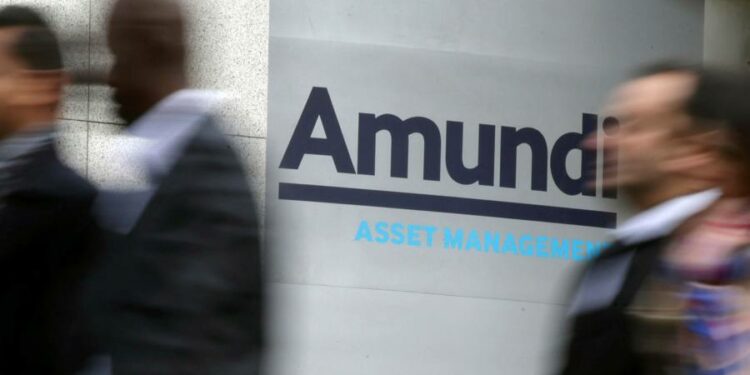Amundi’s assets under management have passed €2tn for the first time, boosted by its acquisition of exchange traded funds business Lyxor and strong inflows to its active management funds in the final three months of 2021.
Europe’s largest asset manager said on Wednesday that net inflows of €65.6bn in the fourth quarter and the addition of €148bn in assets from the Lyxor deal helped push group assets under management to €2.06tn at the year-end. Net income increased 13.9 per cent year on year in the quarter, to €328mn. Overall net income rose 37 per cent in 2021, reaching €1.32bn and ahead of its medium-term targets.
Shares in Paris-based Amundi gained more than 4 per cent on Wednesday morning.
Asset managers anticipate more volatility in 2022 as almost two years of fiscal stimulus that drove markets to record highs and boosted their balance sheets is being reversed.
Valérie Baudson, Amundi chief executive, told the Financial Times she was confident that the group’s diverse business lines and client base would help it ride out choppier markets.
“The acquisition of Lyxor makes me very confident in the future,” she said. “The ETF market is growing roughly twice as fast as the traditional asset management industry and it will be a strong growth lever for us.”
Amundi announced the €825mn acquisition of Lyxor from Société Générale in April last year, which allowed it to leapfrog German rival DWS and become the second-biggest player in European ETFs behind BlackRock.
Amundi’s net inflows in 2021 reached €60.2bn, reflecting strong inflows of €75.5bn to what it calls medium and long-term assets (ie non-money market funds) and to its joint ventures in China and India. These offset €26.6bn in net outflows from treasury products.
Following a similar trend at larger rival BlackRock, which said last month that its active strategies drove fee growth in the fourth quarter, Amundi’s inflows were driven by active management strategies (€55.8bn) and ESG assets.
Baudson said that Amundi had “strong momentum” with both its international third-party distributors and partner networks, notably at Italy’s UniCredit and Spain’s Banco Sabadell.
“Our Asian joint ventures are working very well in China and in India,” she added.
In 2020 Amundi won approval for the first majority foreign-owned wealth management joint venture in China, through a partnership with Bank of China that will allow it to design and manufacture products to sell to mainland investors. This joint venture recorded inflows of €10.1bn in 2021.
Amundi is also preparing to list a 10 per cent stake in its mutual fund joint venture in India, with State Bank of India this summer.
Baudson said that other growth drivers were the private assets business and Amundi Technology, which sells its proprietary software to rival asset managers and institutional investors. It recorded €36mn revenues in its first 12 months, slightly ahead of a target for €150mn in revenues within five years.
Amundi — itself the result of a merger between the asset management companies of Crédit Agricole and SocGen — is not ruling out future acquisitions. Baudson said: “We would look at consolidation in the future but only if it reinforces our distribution network or expertise and makes financial sense. For the time being we’re focused on integrating the Lyxor acquisitions.”
The group recorded a cost-income ratio of 47.9 in 2021, making it one of the most profitable players in the industry. It announced a dividend of €4.1 per share, up 41 per cent on 2020.











